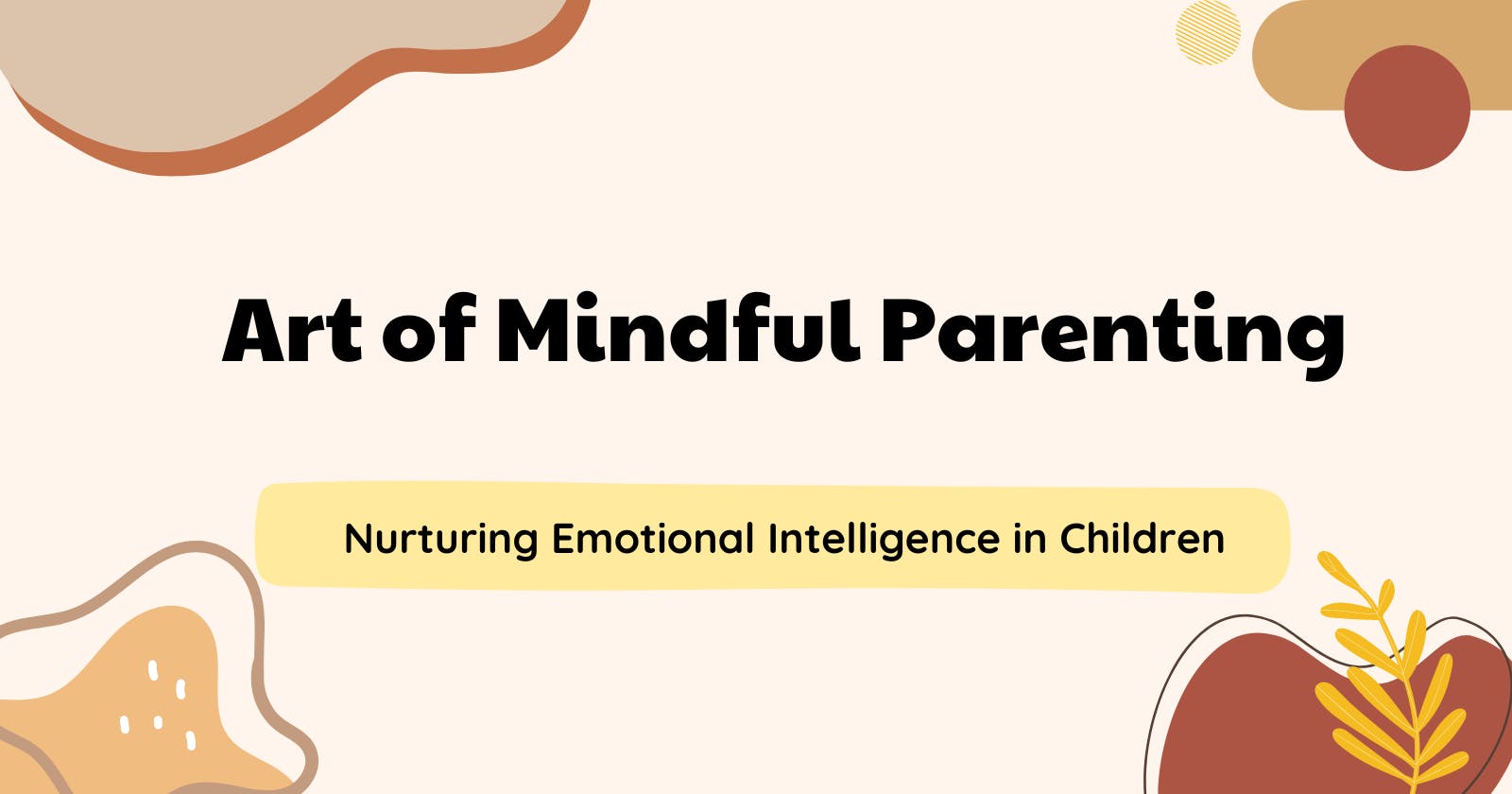Table of contents
- Introduction:
- 🧠 Understanding Emotional Intelligence in Children:
- 🧘♀️ Practicing Mindful Parenting:
- 🏡 Creating a Mindful Home Environment:
- 🗣️ Empathetic Listening and Communicating:
- 🌿 Emotional Regulation and Coping Strategies:
- 🎨 Encouraging Emotional Expression Through Art and Play:
- 🙌 Encouraging Empathy and Compassion:
- 🤗 Nurturing Emotional Bonds and Secure Attachment:
- 🏫 Emotional Intelligence in Education:
- 💞 Being a Role Model:
- 🚀 Embracing Imperfection and Growth:
- Conclusion:
Introduction:
Parenthood is a profound and rewarding journey, and as parents, we play a crucial role in shaping our children's emotional development. Mindful parenting is an approach that encourages parents to be present, empathetic, and attuned to their child's emotional needs. In this blog, we will explore the art of mindful parenting, understanding the principles behind it, and discovering practical strategies to nurture emotional intelligence in our children.
🧠 Understanding Emotional Intelligence in Children:
Before delving into mindful parenting, we must grasp the concept of emotional intelligence in children. Explore the different aspects of emotional intelligence, such as self-awareness, empathy, emotional regulation, and social skills, and how they contribute to a child's overall well-being.
🧘♀️ Practicing Mindful Parenting:
Discover the core principles of mindful parenting and how they promote healthy emotional development in children. Learn about being present with your child, recognizing and validating their emotions, and fostering a secure and loving parent-child bond.
🏡 Creating a Mindful Home Environment:
Examine how the home environment plays a pivotal role in nurturing emotional intelligence. Discuss practical ways to create a mindful and supportive space that encourages open communication and emotional expression.
🗣️ Empathetic Listening and Communicating:
Effective communication is at the heart of mindful parenting. Learn the art of empathetic listening, where parents genuinely understand and validate their child's feelings. Explore communication techniques that foster emotional connection and trust.
🌿 Emotional Regulation and Coping Strategies:
Help your child develop essential emotional regulation skills to manage their feelings effectively. Explore coping strategies like deep breathing, journaling, and mindfulness exercises that empower children to navigate challenging emotions.
🎨 Encouraging Emotional Expression Through Art and Play:
Discover how art and play can be powerful tools for children to express their emotions. Encourage creativity and imaginative play, allowing children to process and communicate their feelings in a safe and non-judgmental space.
🙌 Encouraging Empathy and Compassion:
Explore activities and practices that instill empathy and compassion in children. Engage in community service projects or read books that promote understanding and empathy toward others.
🤗 Nurturing Emotional Bonds and Secure Attachment:
Understand the significance of secure attachment in a child's emotional development. Explore attachment parenting principles that strengthen the emotional bond between parent and child.
🏫 Emotional Intelligence in Education:
Discover the role of emotional intelligence in the educational setting. Learn how schools can incorporate emotional intelligence training to support students' emotional well-being and enhance their learning experiences.
💞 Being a Role Model:
As parents, being a positive role model is essential in nurturing emotional intelligence. Examine your own emotional responses and communication style, and consider how your actions shape your child's emotional development.
🚀 Embracing Imperfection and Growth:
Mindful parenting is an ongoing journey of growth and learning for both parents and children. Embrace imperfections and view challenges as opportunities for growth and connection.
Conclusion:
As parents, we have the profound privilege of shaping our children's emotional development through mindful parenting. By cultivating emotional intelligence in our children, we empower them to navigate life's challenges with resilience, empathy, and self-awareness. Embrace the art of mindful parenting, and watch as your child blossoms into an emotionally intelligent and compassionate individual ready to thrive in the world.
